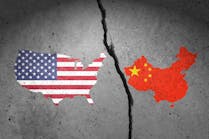Over the years, in this column, we have returned to several perennial themes, including:
- The importance of having a system vs. siloed perspective when solving problems
- The need for trust among trading partners to create a willingness to share data to support effective collaboration
- The value in identifying solutions that can achieve benefits for multiple stakeholders and objectives
This month’s column depicts an initiative between a manufacturer, distributor and provider that once again incorporates all three of those themes and supports what is known as the Triple Bottom Line (supporting people, profits, and the planet). More specifically, we will explore a recent initiative between Ethicon, a Johnson & Johnson MedTech company, Chicago-based Rush Health, and Rush’s primary distributor Concordance that delivered multiple benefits for all three organizations, including cost savings, operational efficiencies, clinician satisfaction, and improvement in environmental sustainability.
It started with a relationship that Rush and Ethicon had strengthened with the successful completion of a Lean Suture program. Through that initiative, Rush was able to both reduce the number of SKUs and better meet clinician needs. With good utilization data, clinicians recognized that their desire to have every kind of suture potentially needed on site made it harder for them to find what they needed in a timely and efficient manner. The data showed that they regularly used only a fraction of the sutures ordered from Ethicon, and Rush credits Ethicon with helping clinicians understand where they could substitute one Ethicon suture for another in the company’s portfolio. Through clinical and supply chain collaboration, Rush now stores only the most commonly used sutures onsite in OR suture rooms with the different suture types color-coded for easy identification. In cases where physicians need a different suture, they can be accessed from an offsite location. The results were impressive, including a 70 percent reduction in waste and expired product and an 86 percent decrease in money spent on suture management.
The success of this program got Ethicon and Rush to consider broader range strategic objectives and longstanding commitments to health equity and environmental sustainability. Once again, the trading partners turned to the data, which this time showed that individual Rush facilities were ordering sutures in a piecemeal fashion, sometimes many times in a month. The orders were handled through different channels, each triggering a separate shipment and at times resulting in expedited freight and minimum order fees, as well as the economic and environmental impacts of multiple orders and shipments.
Because each facility was ordering independently, no one saw the overall opportunity. By analyzing order volume using data from the GHX exchange, Rush and Ethicon realized they had enough volume to consolidate all system suture orders through Concordance. Today, Rush places only one or two orders per month, each of which is distributed by Concordance as part of its regular deliveries and in reusable totes, not cardboard boxes. Ethicon, meanwhile, sends fewer orders and by truck as opposed to sending the sutures in multiple shipments by air, which is both more expensive and has a high carbon footprint. Both Ethicon and Rush also benefit from lower transactional costs associated with order management. Further, Ethicon gets a better demand signal and Rush can be notified in advance of potential inventory challenges.
As with the Lean Suture project, this latest collaboration has delivered a wide variety of benefits to all three organizations, as outlined below:
For Rush, this latest initiative further validates the importance of trading partners being willing to share data to identify and pursue opportunities that deliver value to their respective organizations, the clinicians, other employees, and the patients they serve. In the words of the supply chain leader, “The days of hiding our cards and operating in siloes are over. If we want to truly make an impact, it will take all of us across the entire supply chain, from raw materials to the delivery of patient care.”

Karen Conway | CEO, Value Works
Karen Conway, CEO, ValueWorks
Karen Conway applies her knowledge of supply chain operations and systems thinking to align data and processes to improve health outcomes and the performance of organizations upon which an effective healthcare system depends. After retiring in 2024 from GHX, where she served as Vice President of Healthcare Value, Conway established ValueWorks to advance the role of supply chain to achieve a value-based healthcare system that optimizes the cost and quality of care, while improving both equity and sustainability in care delivery. Conway is former national chair of AHRMM, the supply chain association for the American Hospital Association, and an honorary member of the Health Care Supplies Association in the UK.






